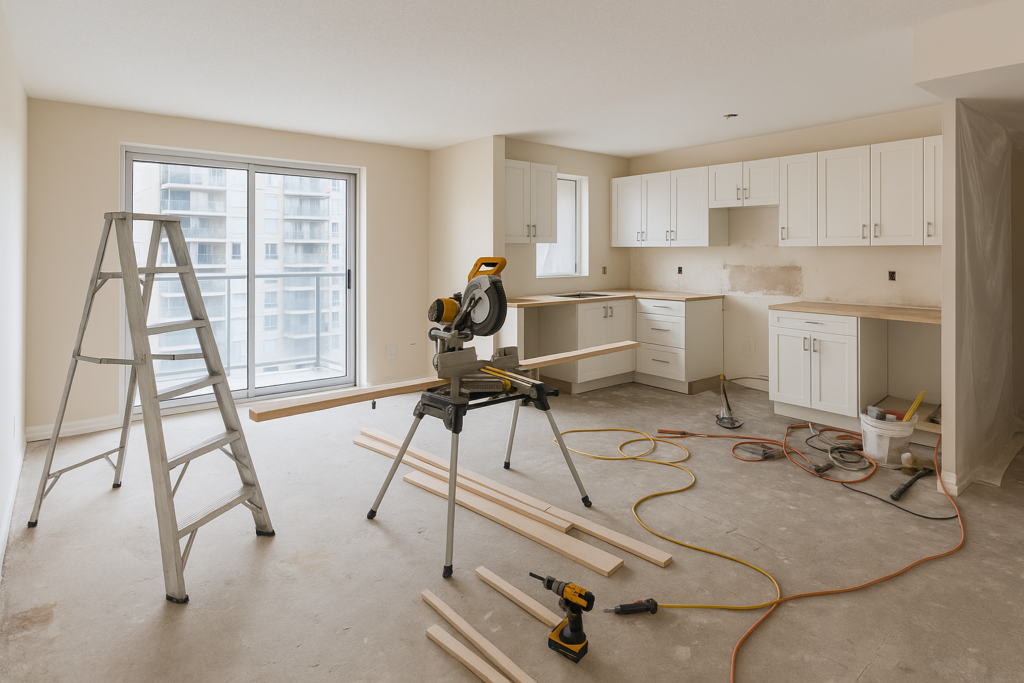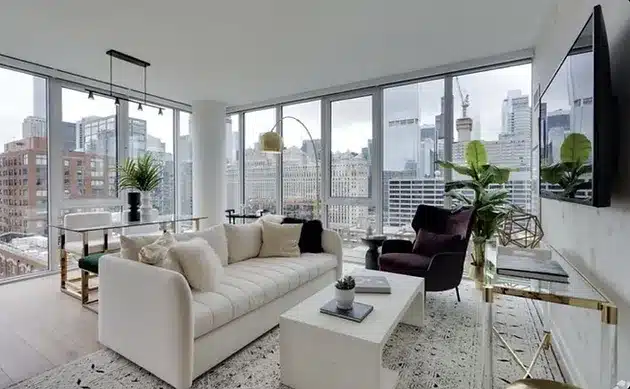Embarking on a condo renovation rules in Toronto comes with its unique set of challenges and regulations. Whether you’re aiming for a simple upgrade or a complete overhaul, understanding and adhering to the city’s condo renovation rules is crucial for a smooth and compliant experience. At KAR Renovation, we’re dedicated to ensuring your renovation journey is as seamless as possible. Join us as we delve into expert tips and insights to navigate Toronto’s condo renovation landscape effectively.
Toronto’s Condo Renovation Guidelines
Are you thinking about sprucing up your condo in Toronto? Whether you want to give it a fresh look, make it more practical, or boost its value, it’s crucial to know the ins and outs of condo renovations in the city. Understanding these rules might seem overwhelming, but don’t worry KAR Renovation is here to help! In this guide, we’ll break down all you need to know about renovating your condo in Toronto, focusing on how to stay compliant with Toronto condo renovation rules.
Condominium Regulations & Requirement:
Insurance and Deposit:
You need to get insurance and might need to give some money upfront (a deposit) to cover any damages that might happen in shared areas.
Work Hours and Noise:
You have to stick to certain times for working and keep the noise down, usually following the rules in the Toronto Noise Bylaw.
Parking and Elevator Access:
Make sure to handle parking and using the elevator well, by booking ahead to reduce any hassle.
Material Transport and Disposal:
Obey the condo rules for safely and cleanly moving and getting rid of construction stuff and trash.
Scope Limitations:
Know the restrictions on renovations, especially concerning plumbing and electrical systems.
Insurance and Deposit Requirements:
Before starting any condo renovation in Toronto, both condo owners and the condo management need to think about insurance and deposits. These are very important to protect both the individual unit owner and the condo building from possible damage during renovations. Getting the right insurance and maybe paying a deposit are important steps that show how serious condo renovations are taken.
This insurance doesn’t just cover possible damage; it also gives peace of mind to condo owners, knowing they’re protected if something unexpected happens. Likewise, the deposit is like a safety net for the condo building, making sure there’s enough money to cover any costs if there’s damage or if renovation rules are broken.
Work Hours and Noise Restrictions:
A big part of renovating condos in Toronto is sticking to certain times for working and keeping noise levels low. These rules usually follow the Toronto Noise Bylaw, which sets limits on how much noise you can make to make sure you don’t bother other people living there. Condo boards are pretty strict about these rules, only allowing renovations during specific times, usually not on weekends or early mornings.
It’s important to understand and follow these noise limits to keep the living environment peaceful for everyone. If you’re planning renovations, it’s important to schedule work times early and talk to your contractors about it to make sure you’re following the rules. This planning helps avoid complaints about noise and any possible fines.
Parking and Elevator Access During Renovations:
Managing parking and using the elevator efficiently is really important when renovating condos. Many condos have rules about where contractors can park, and not booking parking ahead of time can cause extra costs and problems with getting things done. Similarly, using the service elevator for moving construction stuff needs planning and coordination.
Condo owners should book these things ahead of time to make sure the work goes smoothly. This planning doesn’t just save time; it also makes things easier for other people living there. Having a good spot nearby for loading and unloading construction stuff can make the renovation process much smoother and less annoying for everyone in the condo community.
Material Transport and Disposal:
Moving and getting rid of construction stuff and trash have specific rules in condos. These rules are there to keep the condo property safe and clean. Condo owners have to follow guidelines for moving and disposing of materials, like using certain waste bins or arranging for trash removal services.
Handling construction waste and materials isn’t just about logistics; it’s about keeping the condo living space nice. Whether it’s protecting paths used for moving stuff or using waste bins right, these rules help keep the condo clean and organized.
Limitations on Renovation Scope:
When you’re planning renovations for your condo in Toronto, it’s important to know what you can and can’t change. These limits usually have to do with the plumbing and electrical systems, which are shared with other units. For example, if you want to change sinks, toilets, or big parts of the plumbing, you have to think about it carefully and often get approval from the condo board.
Similarly, electrical work in a condo has to follow specific rules. Sometimes you need a permit to do construction there, and it has to be done by a licensed electrician. These rules are there to keep all the condo tenants safe and make sure the building’s electrical systems stay working smoothly.
Navigating Condo Renovations: What’s Changeable and What’s Restricted in Common Areas
In condos, there are places everyone owns together, like hallways, lobbies, and shared spaces. These areas make condo living better for everyone. Unlike your own condo unit, which you own and take care of, these shared places are looked after by the condo board or corporation.
If you want to change these shared areas, you can’t just do it on your own. You need permission from the condo board or corporation. They make sure any changes fit with what everyone wants for the building and follow the rules about how things look and work.
It’s important for condo owners to understand the difference between their own space and the shared areas. While you can decide what to do with your condo unit, changing shared spaces needs input from everyone.
Before starting any renovations in these shared areas, condo owners need to talk to the condo board or corporation. You have to share detailed plans and get their approval first. This helps make sure your changes will make the shared spaces nicer for everyone.
Also, the condo board might have rules and steps to follow for renovations. These rules might include things like how things should look when work can be done, and who can do it. Following these rules helps make sure renovations go smoothly and don’t bother other residents.

In the end, talking openly and working together with the condo board or corporation is really important for making shared area renovations successful. By cooperating, condo owners can make shared spaces nicer while still keeping the condo community happy and harmonious.
The Power of Adaptability: Why Flexibility and Careful Planning Matter
Being flexible and planning well are super important when dealing with condo renovation rules in Toronto. Condo owners need to be ready to change their renovation plans to follow the condo rules and what their condo board says. This could mean changing the renovation or when it happens to fit with what the condo board needs.
Good planning is key to making sure every part of the renovation, like getting a permit and talking to tenants who might be affected, follows the condo’s rules. This helps avoid fights with other tenants and the condo board and stops things from getting delayed or costing more than expected.
Frequently Asked Questions About Toronto Condo Renovation Rules
1. Am I Allowed to Renovate Any Part of My Condo?
Yes, you can renovate your condo, but you need to follow the rules set by the condo corporation and get their approval first.
2. it necessary to let the condo board know about my renovation plans?
Yes, it’s crucial to have your renovation proposal approved by the condo board.
3. Are there limitations on when I can work on my renovations?
Yes, renovations must follow specific work hours and noise restrictions to keep disruptions to a minimum.
4. What’s the best way to handle waste disposal during renovations?
Follow the condo rules by using designated waste bins or arranging for private waste removal services.

KAR Renovation: Your Trusted Partner for Condo Renovations
At karreno.ca, we understand the ins and outs of Toronto condo renovation rules. Our team knows how to navigate the complexities involved, ensuring that every renovation we do follows the condo corporation’s rules.
We specialize in all kinds of condo renovations, from updating kitchens and bathrooms to handling complete unit transformations. Our approach involves careful planning and working closely with the condo board to make sure everything gets approved and fits within the building’s guidelines.
When you choose KAR Renovation, you can relax knowing we’ll take care of everything, from submitting proposals to adding the finishing touches. Our dedication to excellence and following condo renovation rules means you can enjoy a stress-free renovation experience. We’re proud to deliver top-notch work that goes beyond your expectations while sticking to condo regulations.

